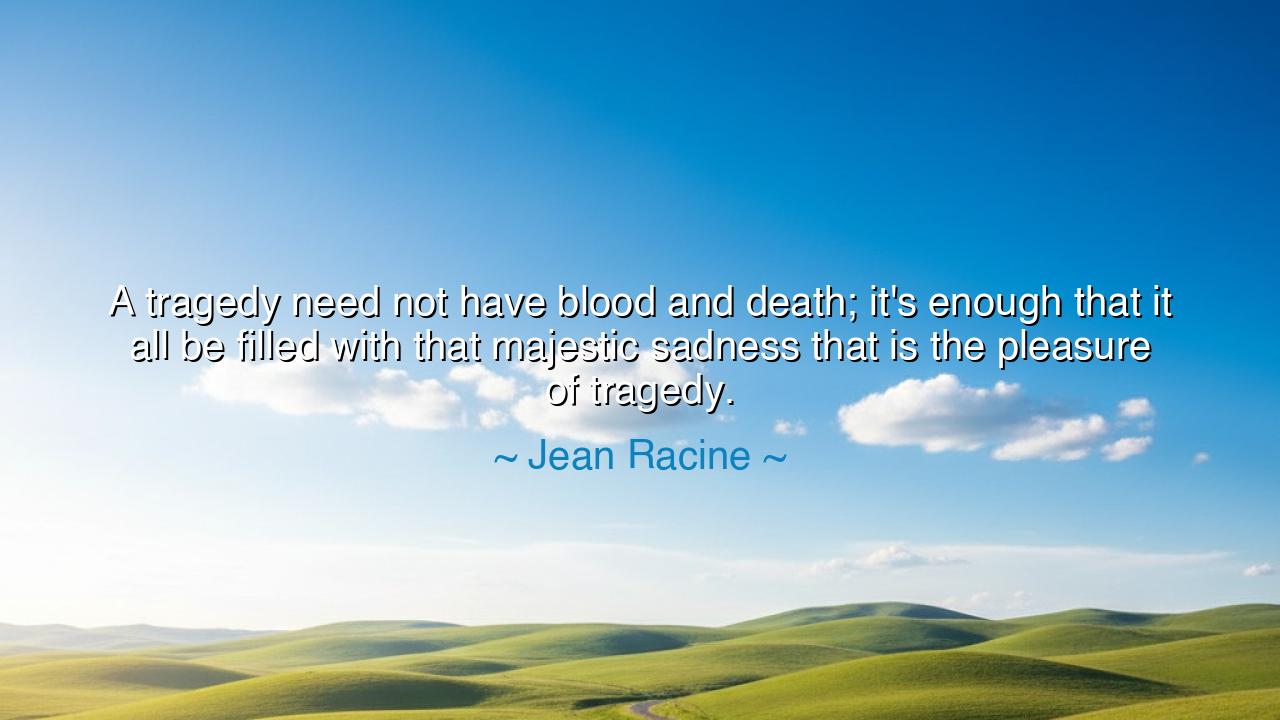
A tragedy need not have blood and death; it's enough that it all
A tragedy need not have blood and death; it's enough that it all be filled with that majestic sadness that is the pleasure of tragedy.






"A tragedy need not have blood and death; it's enough that it all be filled with that majestic sadness that is the pleasure of tragedy." Thus spoke Jean Racine, the poet of sorrow and grandeur, whose words carved the human heart upon the stage. In this saying lies a truth as deep as time itself—that tragedy is not merely the spectacle of violence, nor the fall of kings, nor the spilling of blood. True tragedy dwells in the quiet ruin of the soul, in the majestic sadness that rises when love and fate collide, when the human spirit reaches for the divine and falls back, weeping, into its mortal bounds.
Racine wrote in the age of classical restraint, when the drama of the ancients was reborn in the courts of France. He understood that the essence of tragedy is not chaos, but beauty within sorrow—a harmony between suffering and truth. In his plays, the gods are silent, the passions are vast, and the heart becomes an empire of conflict. For what is more terrible than to see virtue destroyed by love, or innocence betrayed by destiny? This, said Racine, is enough. The pleasure of tragedy lies not in the cruelty of events, but in the recognition of our own frailty—how even in ruin, we remain noble.
Think of Phèdre, Racine’s greatest heroine, consumed by forbidden desire. She does not die in a battle, nor does her tragedy lie in the blade, but in the torment of her own heart. Her suffering is pure and vast, like the sea that separates her from peace. In her confession, we see the eternal conflict between duty and passion, purity and sin. This is what Racine meant: tragedy need not draw blood, for the heart’s own wounds are deeper and more sacred than any the sword can give. The majesty of her sorrow becomes our own, and we are ennobled by the pain we share.
The ancients knew this well. Sophocles’ Oedipus, blinded not by others but by his own realization, stands as a monument to Racine’s truth. When Oedipus sees what he has done, the world itself grows silent. No bloodshed could equal that moment of understanding—the shattering of illusion, the terrible grace of knowing. The audience does not watch to delight in ruin, but to glimpse, through the veil of suffering, the grandeur of the human spirit confronting its limits. This is the divine paradox of tragedy: from sorrow, we draw wisdom; from loss, compassion.
Racine’s insight reaches beyond the stage. It speaks to life itself, for every human life is a kind of tragedy—not because of death alone, but because of the beauty that cannot last. We grow, we love, we strive, and we lose. Yet in the losing, we find depth. The majestic sadness he describes is the mark of those who have lived fully, who have dared to feel deeply. To grieve is not weakness; it is proof of the soul’s greatness. It is through sorrow that we recognize what is sacred, and through tears that we cleanse the heart of vanity.
In the modern world, people flee from tragedy, seeking distraction and laughter. But Racine teaches that there is pleasure in sorrow rightly understood. Not the bitterness of despair, but the solemn sweetness of seeing life as it truly is—fragile, fleeting, yet filled with meaning. When we read, watch, or live through tragedy, we are reminded of our shared humanity. The pain of others becomes a mirror in which we see our own courage reflected.
Therefore, take this lesson, O seeker of wisdom: do not fear sadness. Do not turn away from the tragedies of your own life, for within them lies your refinement. Let your grief be noble, your heartbreak radiant, your tears the wine of understanding. To live is to be wounded, but to love those wounds is to be wise. As Racine tells us, it is not death that defines tragedy, but the soul’s sublime endurance within it.
So when sorrow visits you—and it will—receive it as an old teacher. Let it teach you compassion, patience, and reverence for life’s fragile beauty. Then you will know the secret that Racine knew: that in the heart’s deepest suffering dwells a majestic sadness, and in that sadness, the quiet and eternal pleasure of being human.






AAdministratorAdministrator
Welcome, honored guests. Please leave a comment, we will respond soon